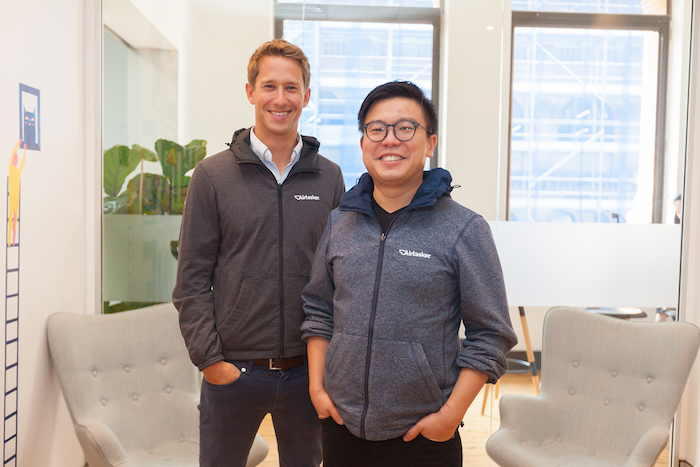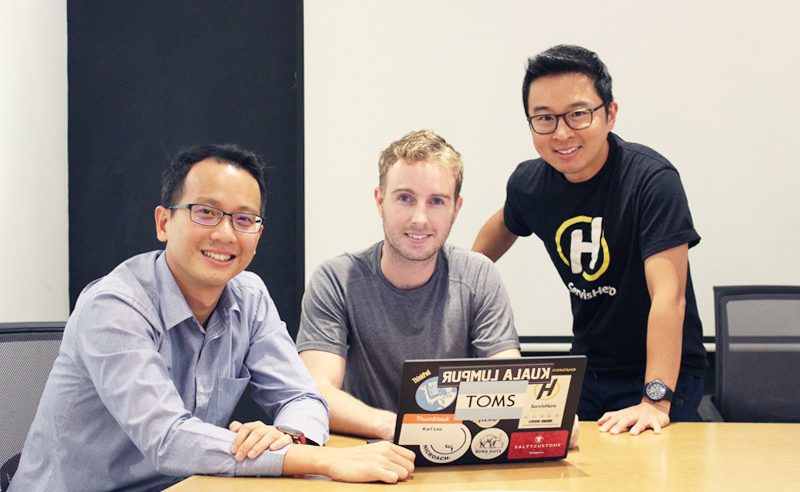|
Getting your Trinity Audio player ready…
|
Tongue-in-cheek, I write about the Fiverr platform where people can hire a freelancer from as little as US$5! That’s quite incredulous isn’t it, that one can in fact setup a… say digital advertising agency and hire talents from around the globe, supervise remotely while possibly sipping Pina Coladas at a tropical beach in Langkawi, then send completed artwork to his client for approval all in a day without moving anything but his fingers and maybe a couple of “fivers”? It’s more than that, I understand. Fiverr was founded by Micha Kaufman and Shai Wininger in Israel and was launched in February 2010. The e-commerce market place charges a US$1 commission on every transaction and has seen through 50 million transactions from freelancers from across 160 countries and planning their billion dollar IPO soon! Gimme a high-fiverr now won’t you?!
Like AirBnb but instead of beds, find tasks!
In Australia, their freelancer alternative is found in AirTasker. This app connects someone who needs a task done, to thousands of people willing, able and skilled to undertake those tasks. It could be anything from fixing an Ikea bed to repairing a car to a WordPress website. According to a report in the Australian Financial Review, AirTasker takes 15% commission on transactions and they posted transactions of up to AUD100 million per year servicing a community of over 2 million members on their platform. and Founders Tim Fung and Jonathan Lui are Sydney-based and will be expanding to Britain this year following a successful Sky Capital injection of US$33 million into their venture that was founded in 2012.
When fostering a longer-term relationship pays
I then wondered about Hong Kong and where a freelancer would look for work, and I found Workana. It seems it’s not just Hong Kong, but a global freelance platform that allows freelancers to create profiles and bid for work. This got me curious and I researched further into their service fee and how much it costs and this is what I found. Commission is paid by the freelancer to Workana, and is tiered starting with 20%. Once the transaction with that one client has gone over US$300, then the commission will be reduced to 10% and when the transaction payout exceeds US$3000, the commission value will only be 5%. Good structure, however that only benefits the freelancer if they get repeat orders from the same client. According to Workana’s website, they wish to foster medium and long-term relationships between clients and freelancers. Interestingly, this site was founded in Buenos Aires, Argentina in 2012 by 4 entrepreneurs; Tomás O´Farrell, Guillermo Bracciaforte, Fernando Fornales and Mariano Iglesias. But these were big boys in the game already, and they made it big in Latin American before coming over to Asia and now boast one million users on their platform.
Finding someone to ‘kaodim’ for you!
A service marketplace for Southeast Asia built by two former lawyers, Kaodim (a common Cantonese phrase used in Malaysia for getting something done) has raised US$11.6 million over three rounds and offers a slightly differently kind of service model where someone would post up their job, then expect to receive quotes from the 500+ suppliers who are initially pre-qualified by Kaodim. Co-founders Jeff Cheong and Choong Fui-Yu have also taken Kaodim to Singapore under the same name, Indonesia using the name Beres, and Philippines under the name Gawin. Kaodim charges their suppliers between MYR3 to MYR 20 (US$1 to US$6) for posting proposals on the platform and is free for customers to use. Founded in 2014, Kaodim connects consumers to everyday needs like air-conditioning repair, cleaning and plumbing services. Within a year of launching the service, the platform received a total of 20,000 quotes submitted from Kaodim’s suppliers, while some suppliers said they gained more than 50 new clients within three months of using Kaodim. The total value of all transactions facilitated came up to MYR40 million (US$10 million). In the same country of 32 million population, another player emerged in 2015 – ServisHero, founded by Karl Loo. Like Kaodim, ServisHero is free for customers to use and suppliers pay a fee to respond to requests and is in Malaysia, Singapore, and Thailand. Service categories include home, fitness, events and learning and the app has 50,000 downloads and some 3,000 suppliers. Using AI algorithms that they built in-house, they’re able to look at market stability, pinpointing categories that need help said Karl in an interview with 2Geeks1City. Furthermore, the platform accepts thousands of quotation requests per day, so this data is fed into their system, and they get a really good insight into the region, keeping a pulse on local businesses.Recommend (formerly RecomN) connects Malaysian and Indonesian users to find service providers for projects – and it seems to have found a niche in home improvement projects. It launched in 2014 and raised USD1 million in seed funding from Gobi Partners. Considering home improvement projects are higher ticket items as opposed to the Fiverr type of projects above, their pricing structure works in terms of Recommend credits. When a project is above MYR50,000 (US$18,000), you pay 3%. If it’s below MYR199 (US$50), you pay 5%. But the credits system is a little tricky and will need some careful reading through their terms and conditions to understand it better. They also provide an escrow service to hold the payments between customer and supplier, ensuring 50% is collected to secure the job and the balance is held in escrow when the customer is fully satisfied.
And there are so many more which we haven’t covered here: Supahands, GoGet.my, Grab and many more! All Malaysian startups! Give me another high five!
Are job platforms like these the Way forward?
The question is, when will corporations decide that they’re done with hiring full-time employees, provide people with job security, insurance, standard leave per year and bonuses. Would full-time employment be a luxury of the future or a bane of the past? Often you’ll find freelancers in the gig economy lose out to full-time working counterparts in these areas; superannuation / EPF retirement funds, insurance coverage and annual leave, plus the assurance of payment once a job is done. It takes a lot of discipline for a freelancer to put these aside. Perhaps a way to move forward for these platforms, is to come out with an option to help design a freelancer care-package for the millions of freelancers. After all, it’s not about finding the cheapest guy to fix your leaky faucets or design a logo? It’s about connecting the most suitable talents to those who need work done. And surely the care and attention should go towards the talents. There, Fiverr has its hands up ready to claim the prize. But read the terms carefully and you’ll see they charge the seller quite a hefty fee of a fifth or 20% on your gross earnings. Plus, they charge US$1 on each transaction to the buyer. Malaysians are quite familiar with the ten percent man. Someone whom you’d be happy to pay 10% to, for a referral. It’s a marketing cost. I mean, real estate agents only charge 2-3%.
When the onus of paying a commission to the platform is placed on the service provider who’s hired for the job, I feel it throws out the balance of provision of service and acceptance of service. It is in my humble opinion that only when a person accepting the service is made equally responsible for paying the commission, will the right balance be finally made and a message reinforced – it’s not just about the service provider, but about the service provided to that person at the time of need, with the best care and attention, best customer service and pricing as well. Both sides are to win. Question is, what about that third side? The platform or person recommending?






